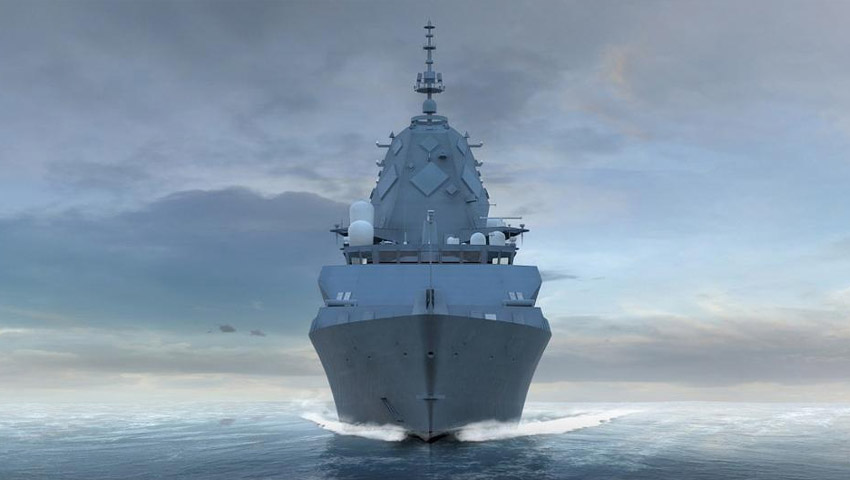Defence Minister Linda Reynolds and Defence Industry Minister Melissa Price have announced ASC Shipbuilding has signed a contract with Indigenous Australian company, TQCSI-Yaran, to commence work during the prototyping phase of the Hunter Class frigate program.
To continue reading the rest of this article, please log in.
Create free account to get unlimited news articles and more!
ASC Shipbuilding, a subsidiary of BAE Systems Australia, has today contracted its first Indigenous business to support prototyping for Australia’s largest surface shipbuilding program.
Adelaide-based TQCSI-Yaran, a majority Aboriginal-owned and operated joint venture, will audit and undertake quality, safety, health and environmental systems certification for the Hunter Class frigate program’s prototyping phase, which begins in December.
During prototyping, the processes, systems, tools, facilities and workforce competencies will be extensively tested and refined before construction starts on the first Hunter Class frigate in 2022.
ASC Shipbuilding placed the contract with Indigenous Defence and Infrastructure Consortium (iDiC) and its consortium partner TQCSI-Yaran.
BAE Systems was the first Australian defence company to develop a Reconciliation Action Plan and has a Strategic Relationship Agreement with the iDiC, which provides genuine opportunities for Indigenous suppliers to become part of BAE Systems’ supply chain.
ASC Shipbuilding managing director Craig Lockhart said, “Diversity in our supply chain is a critical part of developing Australian industry capability (AIC). Through Hunter, and the building of nine submarine hunting warships, ASC Shipbuilding is committed to creating and developing up to 20 new Indigenous businesses and increasing Indigenous employment opportunities over the life of the program.”
TQCSI-Yaran principal Craig Bates reinforced the comments made by Lockhart, saying, “IDiC and TQCSI-Yaran have worked together for three years providing auditing and certification of ISO management systems to companies and organisations wishing to grow their supply chain with Indigenous-owned companies. TQCSI-Yaran’s senior leaders have decades of naval experience and the company is looking forward to building on this contract and potentially building our participation in this world-class program.”
These comments were further echoed by iDiC chief executive Adam Goodes, who said, “We are delighted to be a strategic partner of ASC Shipbuilding on the Hunter Class frigate program. We’ve been working on the program since inception and I am delighted that the iDiC has been able to facilitate this partnership with TQCSI-Yaran.”
Minster for Defence Linda Reynolds said the prototyping phase is on track to begin next month.
“Prototyping is an essential phase in the building of any complex warship. This will ensure that ASC Shipbuilding’s workforce are thoroughly trained in using the state of the art digital equipment in one of the world’s most advanced shipyards at Osborne in Adelaide,” Minister Reynolds said.
“Today’s milestone demonstrates the steps being taken by this government to maximise Australian industry content for the Hunter Class frigate program, while supporting Australian jobs.”
Minister Reynolds added, “I am proud that BAE Systems Australia’s Reconciliation Action Plan and strategic relationship with the Indigenous Defence and Infrastructure Consortium is opening up new opportunities for Indigenous businesses to win work and be an important part of the Hunter Class program.”
Minister for Defence Industry Melissa Price said the Hunter Class frigate program was expected to create enormous opportunities for Australia’s defence industry.
“More than 1,300 Australian companies are already pre-qualified for ASC Shipbuilding’s Hunter Class frigate supply chain,” Minister Price said.
“The work that Adelaide-based TQCSI-Yaran will undertake is an important step for prototyping activities and provides practical training opportunities for Australian workers. I look forward to seeing more Indigenous businesses being contracted to support the government’s National Naval Shipbuilding Program.”
TQCSI-Yaran is a majority Indigenous-owned and operated business partnered with the iDiC. The iDiC has proven capability in various direct and indirect procurement services to support large defence and infrastructure projects.
The nine Hunter Class frigates will be based on the BAE Systems Type 26 Global Combat Ship currently under construction for the Royal Navy, and will replace the eight Anzac Class frigates when they enter service beginning in the late 2020s.
The Hunter Class is billed as an anti-submarine warfare (ASW) centric vessel delivering an advanced ASW capability to the Royal Australian Navy at a time when 50 per cent of the world’s submarines will be operating in the Indo-Pacific region.
BAE Systems Australia announced that it had selected Lockheed Martin Australia and Saab Australia as combat systems integration industry partners, responsible for delivering the Australian designed CEAFAR 2 Active Phased Array Radar, Lockheed Martin designed Aegis combat management system and Saab Australia 9LV tactical interface.
The $35 billion program sees ASC Shipbuilding become a subsidiary of BAE Systems throughout the build process beginning in 2020 at the Osborne Shipyard in South Australia, creating more than 4,000 jobs.
BAE Systems expects the AIC for the Hunter Class build will be 65-70 per cent, which will create and secure thousands of jobs for decades.
At the end of the program the Commonwealth will resume complete ownership of ASC Shipbuilding, thereby ensuring the retention in Australia of intellectual property, a highly skilled workforce and the associated equipment.
SEA 5000 is expected to support over 500 Australian businesses who have been pre-qualified to be part of the Hunter class supply chain, with the Australian steel industry in particular, benefiting from the 48,000 tonnes of steel required to build the ships.
Stephen Kuper
Steve has an extensive career across government, defence industry and advocacy, having previously worked for cabinet ministers at both Federal and State levels.

 Login
Login








